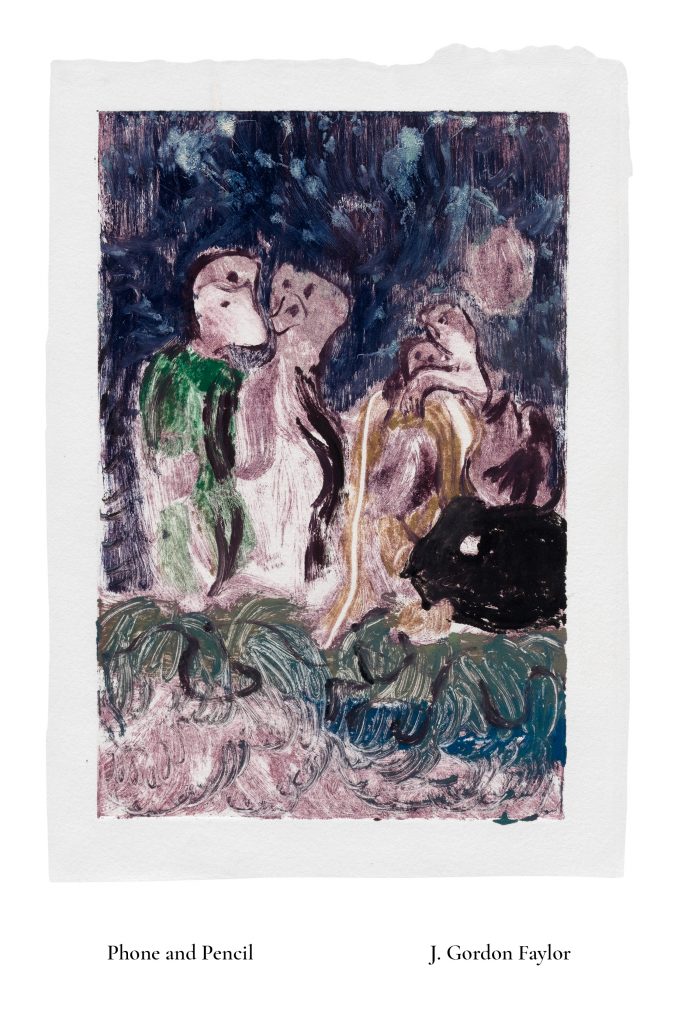
REVIEW BY CLARA B. JONES
—
… I worry about you, puckerdash. You were my favorite
while you lived, and now that I wait until sunset
to congratulate our fathers killed, smokes another
so pearly you lost a car accident image “node” to claw
waiting to light the candles with a triggering glare
you’re crossing the road to post and might find
a common mind eating eggs alone to survive. Empty
pockets. Back readies weekend not that personally,
a master form so long as you keep us real from
dome kin post-address play toms on lock wrestle
when I wait for bad faith morphology graphs a play …
J. Gordon Faylor, Phone and Pencil, p. 67
The cover of this new collection allows the reader to enter the text seamlessly. Brett Goodroad’s Expressionist monotype is reminiscent of an Ernst Ludwig Kirchner painting or, better, of Edvard Munch’s famous artwork, “The Scream.” Angst is the prevalent mood, possibly, symbolizing the human condition, itself—reflecting subjective emotion rather than “the thing itself.” This subjective perspective is woven throughout the text that follows the haunting cover image—including, occasional insertions of referential elements [Gompers; Nina], radically distorting what may be the author’s intended meaning or creating a carefully crafted, indeterminate long poem for the reader’s emotional effect and evoked responses.
Phone and Pencil is the most compelling full-length collection that I have read in recent years, and J. Gordon Faylor proves himself, once again, to be a seasoned writer whose practice has not settled into a predictable style—linguistically, in terms of structure, or with regard to content. His brilliant 2016 novel, Registration Caspar [Ugly Duckling Presse], is a haunting, futuristic tale of a humanoid whose end is near. Faylor, now living on the East Coast, has been called a “Bay Area Beckett.” In addition to writing, he is a museum curator, and, as a publisher and editor [GaussPDF], has highlighted the experimental, often, hybrid, work of seasoned, as well as, early-career artists. Faylor mines the potential of the personal landscape with particular regard for understated, respectful communication with his reader in a way that is, at once, intimate and detached. The rare nod to the lyrical “I” or to overt statements never detracts from the author’s resistance to the literal or the didactic, even though political motivation is a constant undertone throughout his oeuvre.
Indeed, the expressionistic sub-text of Faylor’s new long-poem is, itself, political, the modernist artistic movement, Expressionism, having been a rebuke to Impressionism active on the artistic scene in Europe, more or less, from before WW I to the start of WW II. Phone and Pencil disrupts our understanding of what the mainstream regards as conventional verse, employing “language games” and other innovative compositional features in the service of what is often termed, “associative poetry,” possibly derived from Surrealism’s “automatic writing,” but, crafted with the skills in Faylor’s “toolkit,” an automaticity that has been refined and tempered by an apparent intentionality that, nevertheless, preserves the experiential “flow.”
A good example of the author’s facility with quiet referentiality is Faylor’s use of “Nina” as a repetitive element throughout the text. Nina, the name of cartoonist, Al Hirschfeld’s, daughter, was embedded in many of his drawings as a hidden element or concealed message, not unlike the veiled verbal techniques employed by Faylor that, at once, hide truth and cloud perception. These methods land Phone and Pencil squarely in the domain of postmodern poetry that rejects grand narratives to adopt a tentative and fractured world view. In addition to “Nina,” the collection includes several references to [Samuel] “Gompers,” the famous British-American labor leader active during the late 19th Century to mid-20th Century period.
Like John Ashbery, Faylor’s occasional references to material that the reader may be uninformed about does not interrupt focus—an effect that is very difficult to master. Indeed, once I began reading this book, it sustained my attention in a manner that stimulated my emotions and my intellect. Faylor’s methods of concealment do not deceive or foreclose the receiver [interpreter?] of the literary composition whose effect is balanced and understated—even though I would speculate that the author’s act of creation must have involved a fair amount of “free-association.” Each word seems to have been carefully selected as a stand-alone, as well as, a companion to other words and phrases. Faylor’s expert use of monosyllabic, “hard” words exposes the hand of a mature poet, enhanced by the characteristic that the composition is not self-conscious or studied.
Other features of Phone and Pencil make this a singular literary experience that all readers of innovative poetry will value. Furthermore, anyone curious about experimental writing will find this volume a stellar vehicle for entering the sub-genre. This brief review is an inadequate introduction to the many techniques employed successfully to create a work that is, at once, accessible and challenging. Among these techniques are repetition; neologisms; infrequent, though, effective use of [apparently] “found” phrases bounded by quotation marks; humor; image; music; rhythm—yielding a text that is cohesive, though, non-formulaic. I am, particularly, struck by a playful conceit that enhances the depth, complexity, anticipation, & enjoyment of the experience—that many phrases and sentences appear, upon first encounter, to be sensible, yet, provide a pleasurable, “Ah, hah!” phenomenon upon realizing that veridical meaning is only apparent. Even if you are not a regular consumer of poetry, I recommend Phone and Pencil enthusiastically. This book deserves a large audience, and any new collection by Faylor is to be celebrated.
—
Clara B. Jones is a Knowledge Worker practicing in Silver Spring, MD, USA.
![[PANK]](https://pankmagazine.com/wp-content/themes/pank/assets/images/pank-logo-large.png)
